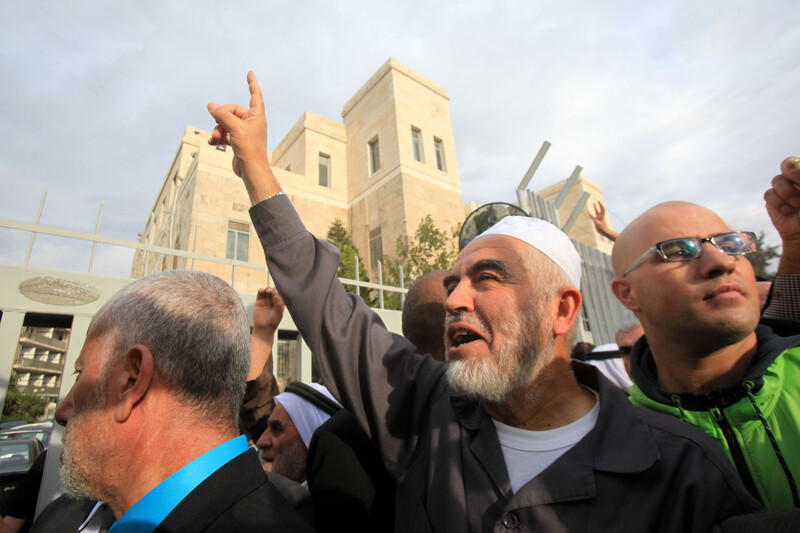Rights and Accountability 17 November 2015

Sheikh Raed Salah, leader of the Northern Branch of the Islamic Movement in Israel, outside a Jerusalem court on 27 October.
APA imagesIn a major escalation of its crackdown on Palestinian citizens in the country, the government of Prime Minister Benjamin Netanyahu outlawed the Northern Branch of the Islamic Movement in Israel on Monday.
The draconian measure means that association, membership or assistance to the party will now be considered a criminal offense.
In July, Israel issued travel bans on the movement’s leader Sheikh Raed Salah and two other prominent figures.
Israeli police conducted overnight raids on the group’s offices on Monday, confiscating computers and seizing documents and cash.
A total of 17 branches were closed, including in Umm al-Fahm, Jaffa, Nazareth, Kufr Kana, Bir al-Saba and Rahat, all cities in present-day Israel with large Palestinian populations.
Police also froze the movement’s bank accounts and the government may now seize other property.
Haneen Zoabi, a Palestinian citizen of Israel and member of parliament for the Joint List, said that the timing of the move, just days after the attacks in Paris, was no coincidence.
Zoabi accused Netanyahu of exploiting the massacre to paint Palestinians struggling for their legitimate rights as no different from the suspected Islamic State gunmen and bombers who killed 130 people.
Adalah, a group that defends the rights of Palestinian citizens in Israel, called the ban a violation of the right to freedom of association and political expression “which a harms the Palestinian-Arab minority in Israel as a whole.”
“Incitement”
Netanyahu accuses the Northern Branch of the Islamic Movement of “incitement” for focusing on the danger to Jerusalem’s al-Aqsa mosque from Israeli government-backed groups whose ultimate declared goal is to replace the Islamic holy site with a Jewish temple.
Last month, Isaac Herzog, leader of the Zionist Union, Israel’s ostensibly dovish official opposition, also called for the group to be outlawed.
On Tuesday, the Zionist Union lauded the decision and admonished Netanyahu for not doing it sooner.
But two weeks ago, Yoram Cohen, the head of Israel’s Shin Bet secret police, told the government he had no evidence linking the group to terrorism and objected to proposals to outlaw it.
Pursued by state
The Islamic Movement in Israel was founded in the 1970s but split in 1996. While the Northern Branch observes a complete boycott of Israel’s institutions, the Southern Branch participates in elections.
Three members of the Southern Branch serve as lawmakers in the Israeli parliament, as members of the Joint List, an alliance of Palestinian and Israeli political parties.
The ban on the extra-parliamentary Northern Branch will likely encourage Israeli politicians seeking to outlaw even Arab parties that are represented in parliament.
The movement’s leader Raed Salah, a former mayor of Umm al-Fahm, has long been targeted by the Israeli state.
Last month, a court rejected Salah’s appeal against an 11-month prison sentence he received in March 2014.
The conviction was for supposed “incitement to violence” over a speech he delivered in 2007.
Ahmed Tibi, a member of the Israeli parliament for the Joint Arab List, said the court had been “influenced by the impassioned public atmosphere.”
Salah was previously jailed for two years in 2003 after he was convicted for supporting “terrorism” over fundraising for charities in the occupied West Bank and Gaza Strip.
In an extensive 2007 interview with the Journal of Palestine Studies, Salah said, “To this day I don’t know the real reasons for my arrest and imprisonment. Maybe it had something to do with our role in thwarting Israel’s schemes targeting al-Aqsa mosque through our rehabilitation and restoration works, even though we worked under the umbrella of the al-Awqaf Committee and the al-Aqsa Mosque Restoration Committee” – bodies recognized by Israel that manage the holy site.
Salah also noted that long before his trial in 2003, then-Prime Minister Ariel Sharon had explicitly called for outlawing the Islamic Movement.
The ban imposed this week further erodes the distinction between how Israel treats Palestinians who live under military occupation in the West Bank and Gaza Strip, on the one hand, and the 1.5 million in present-day Israel, on the other, who supposedly enjoy more civil and political rights, even if not on a par with Jews.
Poetic fabrication
In June 2011, Salah was detained in the UK after interior minister Theresa May moved to bar him from the country where he was due to give lectures.
As The Electronic Intifada reported, May’s claim that Salah had written an anti-Semitic poem was based on fabrications provided by an Israel lobby group.
Ten months later, a UK court overturned the ban, finding no evidence to support it and completely vindicating Salah.
Ali Abunimah contributed research and translation.
Tags
- Northern Branch of the Islamic Movement in Israel
- Raed Salah
- Palestinians in Israel
- Shin Bet
- Umm al-Fahim
- Jaffa
- Bir al-Saba
- Nazareth
- Kufr Kana
- Rahat
- Isaac Herzog
- Zionist Union
- Yoram Cohen
- Journal of Palestine Studies
- Ahmed Tibi
- Joint Arab List
- Southern Branch of the Islamic Movement in Israel
- Al-Aqsa Mosque
- Theresa May
- United Kingdom
- Haneen Zoabi
- Paris attacks
- ISIS
- Adalah






Comments
Ah, so Israeli is worried about "incitement" over al-Aqsa...
Permalink Michael Lesher replied on
If the Israeli government wants to curtail dangerous incitement in connection with al-Aqsa, its correct course is obvious. Extremists like Yehuda Glick are openly seeking a Jewish-Israeli takeover of the Muslim holy site, and their provocations have led to repeated armed attacks against worshipers who have tried to protest against them. THESE are the inciters whose actions should be curtailed.
But of course the real goal is to encourage violence, not to reduce it -- violence against Palestinians and Muslims, that is.
Nationality
Permalink Martin replied on
You use the term "Palestinian Citizens"--citizens of what nation? Do you mean Jordan? Or Gaza or what?